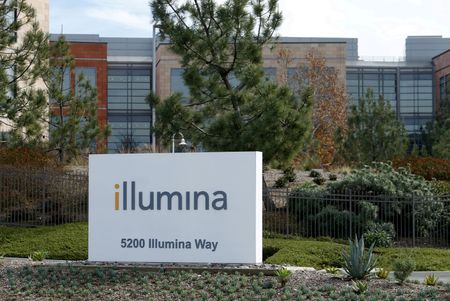
WASHINGTON (Reuters) -Life sciences firm Illumina on Monday filed an appeal against a Federal Trade Commission (FTC) order demanding that it divest cancer diagnostic test maker Grail over competition concerns in the U.S. market for cancer tests.
The FTC, which enforces antitrust law, first filed a complaint in March 2021 to stop Illumina’s bid for the remainder of its formerly part-owned subsidiary.
Illumina completed the deal that year despite the challenge from the FTC, which wanted it to sell Grail, and another from European Union regulators.
But Judge Michael Chappell, an administrative law judge at the FTC, last year dismissed the agency’s concerns that the Grail acquisition would hurt competition. The FTC staff appealed the decision to agency leadership, which again ruled that the deal should be undone.
Illumina on Monday filed an appeal with the Fifth Circuit U.S. Court of Appeals.
The FTC has been concerned that Illumina, the dominant provider of DNA sequencing of tumors and cancer cells that help match patients with the best treatment option, might raise prices or refuse to sell to Grail’s rivals.
Grail, valued at $7.1 billion under Illumina’s deal, is seeking to market a powerful test to diagnose many kinds of cancer from a single blood test, known as a liquid biopsy.
Illumina has pledged to continue selling its DNA sequencing services to other firms. It has offered to sign contracts to supply any of Grail’s rivals and to not raise prices.
Under Chair Lina Khan, the FTC is taking a tougher look at mergers because of concerns that consolidation would lead to less innovation and higher prices for consumers.
The deal also faces stiff headwinds in Europe.
In early December, EU antitrust regulators proposed measures for Illumina to unwind its acquisition of Grail, three months after blocking the deal on concerns it would hurt competition.
Illumina has also appealed that decision on the grounds that it does no business in Europe and therefore the EU competition enforcer has no jurisdiction.
The fight also spawned conflict between Illumina’s leadership and billionaire investor Carl Icahn, who owns 1.4% of the company and urged Illumina to unwind its deal for Grail, which he called a risky acquisition.
Illumina CEO Francis deSouza, who was challenged by Icahn nominee Vincent Intrieri, survived the campaign.
(Reporting by Diane Bartz and Mrinmay Dey; Editing by Jacqueline Wong and Jamie Freed)
